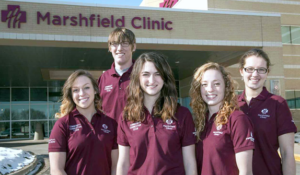Connecting Clinics, Campuses, and Communities to Advance Health Equity
At a Glance
The Community Connections Team (CCT) model is a collaboration between the University of Wisconsin-Eau Claire, Family Health Center of Marshfield and Marshfield Clinic that aimed to advance health equity by training volunteers to connect patients to community resources. This initiative began because many patients have unmet social needs that impact their ability to fully address their health concerns and be well again. To date, Marshfield health providers have screened 53,700 patients. Of those, 7,600 were referred to CCT to access resources for food, housing, transportation and other vital needs. Volunteers were instrumental in making these connections and gained valuable insight into community needs. Overall, CCT’s work underscores the significance of addressing social determinants in order to advance health equity within health care systems.
The Challenge

Health care systems tend to turn to traditional approaches such as medication, therapies or procedures to treat illness or disease. However, many patients have unmet social needs that impact their ability to fully address their health concerns and be well again. Evidence suggests that only 10 percent of health outcomes are driven by medical care, while the remaining 90 percent of health outcomes are impacted primarily by social, behavioral, environmental or other factors. As a result, addressing upstream social needs is necessary to advance health outcomes and health equity due to time constraints and inadequate knowledge of resources.
The Community Connections Team (CCT) model was developed collaboratively by Marshfield Clinic, Family Health Center of Marshfield, Inc. and the University of Wisconsin-Eau Claire to recruit, train and supervise volunteers to make connections between patients with social needs and community agencies that can provide assistance. Volunteers establish referrals to appropriate community resources and continue to follow up with the patient until the need has been met. CCT has been piloted at Marshfield Clinic locations since 2015.
Project Goals
This project aimed to maintain, refine and expand the existing CCT program through four specific project objectives that will gather the evidence base needed to support future sustainability and replication of the program:
- Empowering Communities: Develop an inclusive governance structure that engages and empowers all affected constituents and interested stakeholders, refining the existing CCT model to authentically engage those affected by health inequity.
- Development of Future Workforce: Strengthen the ability of the next generation of health care professionals and citizens to think critically about health equity through volunteerism in CCT.
- Demonstrate Impact: Evaluate the impact of the CCT model on patient health outcomes to demonstrate the effects of universal screening and intervention for social needs on patient health outcomes.
- Expand Reach: Establish the potential for model replication as an economical, effective and sustainable way by which the social determinants of health can be identified within the healthcare setting to advance health equity
Results
This project made significant progress toward each of its objectives: empowering communities, development of future workforce, demonstrate impact and expand reach.
Empowering Communities: The project focused on addressing social needs in communities. To date, Marshfield health providers have screened 53,700 patients. Of those, 7,600 were referred to CCT to access resources for food, housing, transportation and other vital needs. Volunteers played a crucial role in connecting individuals to community resources and gaining insights into community needs. More than 140 students from UW-Eau Claire and UW-Stevens Point have been trained to staff the CCT.
Development of Future Workforce: CCT collaborated with students in various majors at the University of Wisconsin-Eau Claire and University of Wisconsin-Stevens Point and engaged them through virtual training to overcome transportation barriers. More than 140 students who were planning to enter a variety of health professions have been trained to staff the CCT. An alumni volunteer survey was conducted and results indicated that volunteers highly recommend volunteering for CCT, felt well-supported and believed their experience positively influenced their knowledge of community resources and social determinants of health.
Furthermore, CCT partnered with UW-Stevens Point Doctor of Physical Therapy program, Wisconsin Area Health Education Centers Scholars Program, and Americorps to offer hands-on and service-learning opportunities and mentorship related to addressing social-economic needs.
Demonstrate Impact: The project adapted to a new electronic medical record (EMR) platform called Cerner that was implemented throughout the Marshfield Clinic Health System. In an effort to continue to receive referrals to CCT, staff sent updated CCT referral processes to department managers two weeks before and after each Cerner launch date. In total, 41 departments screened patients for social needs through the EMR. Departments that do not have access to the EMR, referrals came through CCT shared email, internal staff calls and self-referrals via the CCT phone hotline. The CCT also expanded its services to Family Health Center Dental Centers in Ladysmith and Rice Lake and received 114 screeners from these centers in 2022.
Expand Reach: The project team collaborated with the Wisconsin Institute for Public Policy and Service (WIPPS) to conduct focus groups and understand the community and organizational challenges related to health inequities. These discussions highlighted issues including limited public transportations, funding shortages and the need for more resources.
Learn more about the Community Connections Team